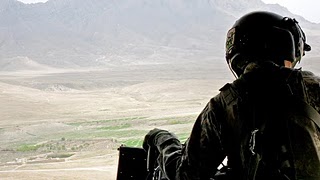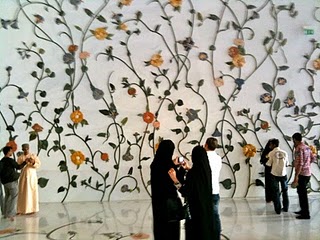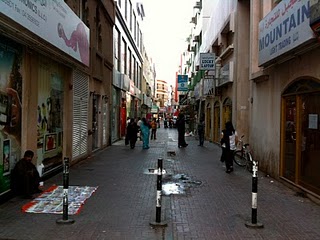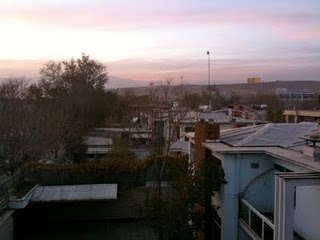The hardest things about traveling military air are the layovers and the incessant waiting. The best thing is that it is free. Normally free outweighs the inconvenience of the “hurry up and waits.” As I get older, though, my preference is to pay for the convenience of direct flights, especially on commercial airlines.
Since I was headed south to Kuwait to attend meetings for work and I didn’t have any assurances that I’d be able to get an R&R in conjunction with my business trip, I opted not to spend $800 for a roundtrip commercial ticket from Kabul International Airport to Kuwait City.
My Kuwait business trip was worthwhile and I finagled an R&R to the UAE. I got really used to staying in nice apartments and hotels for the week I was down from Afghanistan. Then, it was over way too soon and I had to make my way back to the ‘stan.
Returning to Kabul was a grind. First, I had to process through Ali again, turn-in my passport to receive the exit visa from Kuwait (resulting in another night in the tent), and once that was done I was allowed to manifest for flights north to Afghanistan. There are no direct flights to Kabul. One must either fly to Kandahar or to Bagram. Kandahar is a mess and no one without any business there would want to fly there. There were lines of folks in the pax terminal trying to manifest to Kandahar. I wasn’t one of them.
There were a couple of flights scheduled for Bagram. The way it works is this: based upon one’s priority (as a sillyvilian I have next to none) and when one signed up for the waiting list (done after obtaining the exit visa), a rank order of potential passengers to specific locations is created. There are “show times” scheduled three hours before each flight where one has to attend to determine if he is going to get on the flight. Flights are scheduled round the clock so Show Times occur at all hours of the day. In addition, there are accountability roll calls at 1000 hours every morning that you have to attend or you fall off the rank order list.
I attended the accountability roll call the next day at 1000 hours and saw that there were a couple of more flights scheduled for Bagram. Good news. That meant that I was definitely going to get out within the next 24 hours. So, I attended the first Show Time at 1500 hours only to find out that I wasn’t going to make that flight. Next Show Time was at 2000 hours. I didn’t make that one either. The next Show Time was scheduled for 0130 hours. Nope didn’t make that flight but there was another flight scheduled an hour later so I hung around the pax terminal to see if I got on it. I did.
So, it now is 0245 hours, and I am scheduled to fly, and now I have to return to my tent, pack up my belongings in the dark, drag my duffle bags back to the luggage area to get palletized, and then return to the pax terminal to wait for the buses to haul us out to the airfield. I took the opportunity to shave and wash my hair in the sink (at the latrine trailer) before I reported in.
The buses arrive on time at 0445, we arrive at the airfield at 0500, wait around for the pallets to get loaded, board the C -17 at 0530, and sit on the runway until 0615 when wheels come up. An easy 4.5 hour flight to Bagram and we arrive around noon. We file off the C-17 in two lines, marching off the tail ramp wearing our helmets, body armor, bug-out packs, and weapons. 15 years after I retired from the Army and here I am again, indistinguishable from a distance from the rest of the soldiers, airmen, and marines filing off the plane. Form up, left face, forward march...
And then the whole goddamned process begins all over again. We swipe our CAC (Common Access Card) cards, report to the Contractor Office where they make sure we’re going where we’re supposed to go, then go to the flight desk to sign up for flights to Kabul. There is only one scheduled on the board and all kinds of troops are hanging around trying to get on it. I figured that we were doomed. I haven’t slept for over 24 hours and haven’t bathed in over 48. Now I’m condemned to a bare, cement-walled compound where others like me are waiting for flights that may come, or not.
We’re only 55 miles from Kabul. A few years ago we could have driven back without a problem. Today, the road is a linear ambush site littered with IEDs and ragheads wanting to become martyrs. So close, and yet so far.
One good thing about Bagram is that my company runs the data communications sites there. I called my boss who arranged transport and I had to opportunity to conduct some business there and meet with some folks that I had spoken with only over the telephone.
We ate dinner at the DFAC (Dining Facility) and then headed back to the pax terminal to see if there were any additional flights. There were. Two more flights to Kabul were scheduled. All three flights were C-130s. The last flight of the night had no cargo to haul so it was able to transport all the remaining Kabul-bound passengers on the waiting list. We loaded our luggage again onto the pallets, waited two hours in the pax terminal, put on our IBA and helmets, formed-up, right face, forward march…and filed-out to the C-130 at 2330 hours. A quick 15-minute flight to Kabul and I was standing three miles from my safe house.
Three miles and six hours later I arrived. Our drivers aren’t allowed on the roads after 2300 hours. I was forced to spend six more hours sitting up in a tent with patio tables waiting for twilight. My head nearly jerked off of my neck three or four times during the night. I walked around getting fresh, cool air. I tried to do Sudoku. I tried creating this post but only wrote the first few lines before I lost interest. Tried to sleep but was awakened by two Dutch Military Policemen asking me why I was lying on the PX picnic tables at 0400 in the morning.
Next time I’m spending $800 for the privilege of not having to relive any of these moments again. Reliving my Army career here has been difficult enough.




































